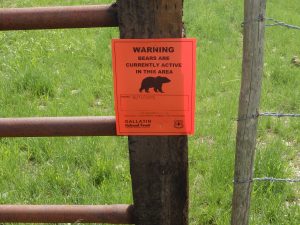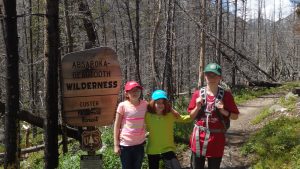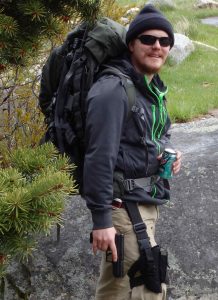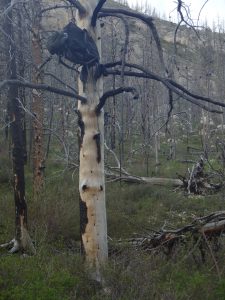Safely Hiking and Backpacking in Bear Country
For some, hiking or backpacking in bear country is a truly terrifying experience. Hiking down a trail in the wilderness has its hazards, and bears can certainly be one of those hazards. Camping in bear country is even more dangerous- extra precautions need to be taken to prevent an attack at night, and to keep food scents out of your tent. Knowing how to safely hike or backpack in bear country can prevent a bear attack, and save your life.
On the Trail
When you’re hiking in bear country, a few simple precautions could prevent an attack on the trail. Bear attacks fall into three categories: defensive, territorial, and predatory. When you’re on the trail, it’s safe to say that a bear isn’t hunting you- bears don’t typically stalk hikers that are minding their own business. Instead, most bear attacks occur from hikers that surprise bears on the trail, or from hikers that don’t respect a bear’s space. You can prevent both of these situations by making more noise on the trail, which is easy.
Hike in Groups
Studies have proven that hiking in a group of people is one of the best ways to prevent a bear attack. Not only will a group of people intimidate a bear, which prevents an attack, a group will also be able to aid an attacked member, or scare a bear away. Groups also make considerably more noise on the trail than a solo hiker, which allows a bear to hear the hikers (and flee) in advance. Most bear attacks occur when hikers ignore this important tip, and hike by themselves. If you do choose to hike alone, the next tip will be crucial- and allow you to make just as much noise as a group.
Bear Bells
Love them or hate them, bear bells are incredibly useful in making enough noise on a trail to scare or alert a nearby bear. Although they are a nuisance on the trail (jingle, jingle, jingle), and scare away practically all wildlife, bear bells are incredibly effective at preventing a bear attack. If you do carry a bear bell, attach it to an area of your pack that allows it to move freely. I attach my bear bell to the left side of my pack, on a support strap near my abdomen; in my case, this allows the bell to move the most while hiking, making the most noise. Once you have the noise levels covered, it’s time to look at how you can protect yourself during a bear attack.
Bear Spray/Firearms
This is a sensitive subject- most experts agree that bear spray is more effective than a firearm at preventing or stopping a bear attack. Bear spray is inexpensive, effective, and lightweight- but it does have its disadvantages. In a surprise encounter with a bear, for instance, you will likely be upwind of the bear; spraying a bear that is upwind will likely result in covering yourself in bear spray- a compromising situation to say the least. Firearms proponents will also say that a warning shot can be extremely effective in stopping an attack, and will stop the attack at a greater range than bear spray. No matter which personal protection you bring on the trail, ensure that it is securely mounted on your belt, and not your pack. Mounting bear spray on your pack will almost certainly result in it falling, to only be picked up by another hiker (I’ve found four canisters, so far). If you decide to camp in bear country, be sure to also bring your protection inside of your tent, where you’ll need to take some additional precautions.
Camping in Bear Country
Unlike bear encounters on the trail, most bear attacks at night are predatory. A bear inside your camp is searching for one thing- food. You can minimize the food scents inside of your camp a few different ways:
-
Hang your Food
Hanging your food, hiking gear, and anything else that isn’t clothing or bear spray, will greatly reduce the chances of a bear searching your camp for food. To hang your food, simply tie a rock onto a length of parachute cord, and throw the rock over a tree branch that is at least ten feet high, and at least 100 yards from your camp. This will keep your food outside of any bear’s reach, and eliminate food scents in your camp.
-
Don’t Cook, Clean, or Prepare Food at Camp
What’s the point of cooking, cleaning dishes, or preparing food at camp, if you are hanging your food 100 yards away? Keep all food scents far away from your camp to prevent a predatory attack.
-
Camp in Groups
You’re in the outdoors, and there’s plenty of space- why would anyone want to camp within a few yards of their backpacking companions? The answer is as simple as why you would want to hike with a partner- bears are intimidated by groups. If your backpacking buddy’s camp is 100 yards away, a bear will be more inclined to attack, and your buddy won’t be able to help you in the event of an attack.
Relax.
Even though this article has discussed the reality of bear attacks, bear attacks are still extremely rare. For instance, Yellowstone National Park has only reported eight deaths due to bear attacks during the park’s history. Considering that the park received over 90 million visitors from 1980-2011, the odds of a fatal bear attack in Yellowstone are roughly one in 11 million. In contrast, the odds of being fatally killed in a lightning strike are one in 2.6 million. You’re four times more likely to be struck by lightning, than to be killed by a bear in Yellowstone. As long as you’re prepared against bear attacks, you’ll be just fine against those odds.



